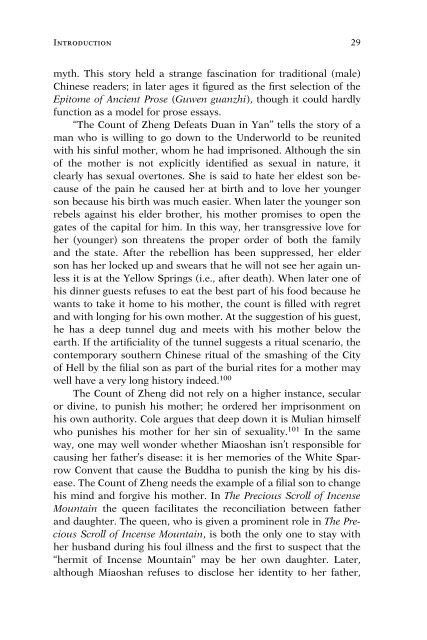Two Precious Scroll Narratives of Guanyin and Her ... - Khamkoo
Two Precious Scroll Narratives of Guanyin and Her ... - Khamkoo
Two Precious Scroll Narratives of Guanyin and Her ... - Khamkoo
Create successful ePaper yourself
Turn your PDF publications into a flip-book with our unique Google optimized e-Paper software.
Introduction 29<br />
myth. This story held a strange fascination for traditional (male)<br />
Chinese readers; in later ages it figured as the first selection <strong>of</strong> the<br />
Epitome <strong>of</strong> Ancient Prose (Guwen guanzhi), though it could hardly<br />
function as a model for prose essays.<br />
‘‘The Count <strong>of</strong> Zheng Defeats Duan in Yan’’ tells the story <strong>of</strong> a<br />
man who is willing to go down to the Underworld to be reunited<br />
with his sinful mother, whom he had imprisoned. Although the sin<br />
<strong>of</strong> the mother is not explicitly identified as sexual in nature, it<br />
clearly has sexual overtones. She is said to hate her eldest son because<br />
<strong>of</strong> the pain he caused her at birth <strong>and</strong> to love her younger<br />
son because his birth was much easier. When later the younger son<br />
rebels against his elder brother, his mother promises to open the<br />
gates <strong>of</strong> the capital for him. In this way, her transgressive love for<br />
her (younger) son threatens the proper order <strong>of</strong> both the family<br />
<strong>and</strong> the state. After the rebellion has been suppressed, her elder<br />
son has her locked up <strong>and</strong> swears that he will not see her again unless<br />
it is at the Yellow Springs (i.e., after death). When later one <strong>of</strong><br />
his dinner guests refuses to eat the best part <strong>of</strong> his food because he<br />
wants to take it home to his mother, the count is filled with regret<br />
<strong>and</strong> with longing for his own mother. At the suggestion <strong>of</strong> his guest,<br />
he has a deep tunnel dug <strong>and</strong> meets with his mother below the<br />
earth. If the artificiality <strong>of</strong> the tunnel suggests a ritual scenario, the<br />
contemporary southern Chinese ritual <strong>of</strong> the smashing <strong>of</strong> the City<br />
<strong>of</strong> Hell by the filial son as part <strong>of</strong> the burial rites for a mother may<br />
well have a very long history indeed. 100<br />
The Count <strong>of</strong> Zheng did not rely on a higher instance, secular<br />
or divine, to punish his mother; he ordered her imprisonment on<br />
his own authority. Cole argues that deep down it is Mulian himself<br />
who punishes his mother for her sin <strong>of</strong> sexuality. 101 In the same<br />
way, one may well wonder whether Miaoshan isn’t responsible for<br />
causing her father’s disease: it is her memories <strong>of</strong> the White Sparrow<br />
Convent that cause the Buddha to punish the king by his disease.<br />
The Count <strong>of</strong> Zheng needs the example <strong>of</strong> a filial son to change<br />
his mind <strong>and</strong> forgive his mother. In The <strong>Precious</strong> <strong>Scroll</strong> <strong>of</strong> Incense<br />
Mountain the queen facilitates the reconciliation between father<br />
<strong>and</strong> daughter. The queen, who is given a prominent role in The <strong>Precious</strong><br />
<strong>Scroll</strong> <strong>of</strong> Incense Mountain, is both the only one to stay with<br />
her husb<strong>and</strong> during his foul illness <strong>and</strong> the first to suspect that the<br />
‘‘hermit <strong>of</strong> Incense Mountain’’ may be her own daughter. Later,<br />
although Miaoshan refuses to disclose her identity to her father,

















